One of Ethan Heard’s first loves was musical theater. Having grown up in the DC area, Heard performed in over 20 musicals before going to college. Yet Heard has made a name for himself by engaging in all elements of theatrical arts: he is the co-founder and former artistic director of the Heartbeat Opera, a New York City–based company staging adaptations of classic opera stories such as Fidelio, Carmen, and Macbeth. He also taught acting and directing to graduate students at the Yale School of Drama and the Yale Institute for Sacred Music from 2015 to 2022.
Now, he’s returning to his musical theater roots in the DC area. In March of 2022, Heard officially joined Signature Theatre in Arlington as associate artistic director. Since joining, he’s directed the new comedy Which Way to the Stage and helped bring to life “So Many Possibilities: A Season of Sondheim,” a tribute to the late composer and lyricist whose musicals have been a cornerstone of Signature Theatre’s artistic identity for decades.
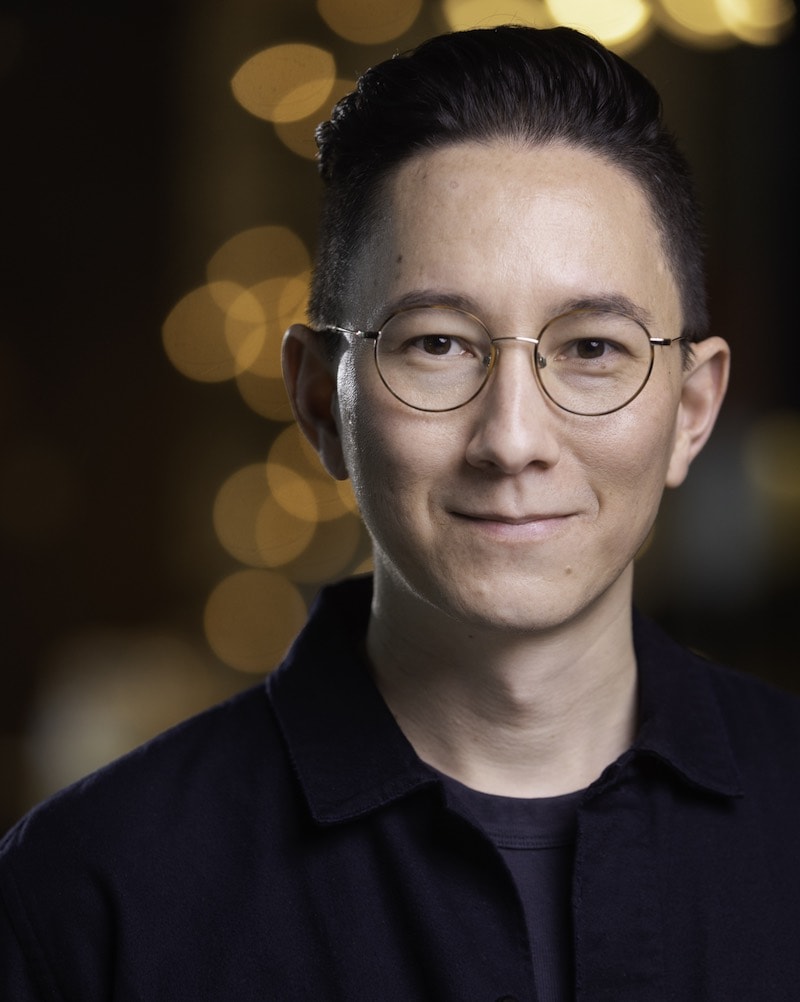
This past March, Heard took on probably his biggest challenge at Signature Theatre yet: directing Pacific Overtures, one of Stephen Sondheim’s rarely produced musicals. With music and lyrics by Sondheim, a book by playwright John Wediman, and additional material by Hugh Wheeler, Pacific Overtures was originally staged on Broadway in 1976 and narrates a transitional period in Japan’s history.
From 1603 through 1867, Japan operated under the policy of sakoku (“closed country” in English), not allowing any foreigners into Japanese territory and creating an isolated society. That all changed in 1853 when the American Commodore Perry arrived in Edo Bay, under the direction of President Millard Fillmore to break sakoku with military force, and establish trading ports. The Japanese government was forced to acquiesce, understanding that they couldn’t fight the industrialized American warships. It was the end of an era for Japan, which was violently dragged into the Western world’s imperialism. For America, it was yet another step in creating what historian Daniel Immerwahr calls a “pointillist empire,” a military machine with territories and points of contact across the globe.
This historical moment seems difficult to dramatize: how do you tell the story of a whole nation undergoing a seismic change? Weidman takes a wide-ranging approach, using an enormous cast of characters to reveal how societal changes impact interpersonal relationships. Sondheim’s songs track the difficult decisions characters must make with intricate melodies and playful lyrics. Together, Weidman and Sondheim create historical fiction drama that feels sometimes like a gross pageant of imperial violence and other times like a speculative rumination on lives whose stories are rarely told.
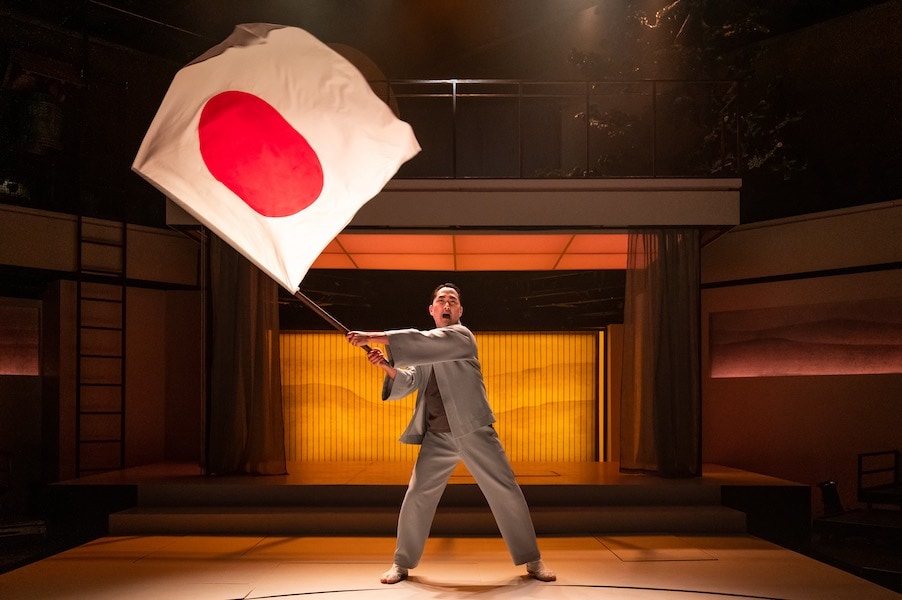
Pacific Overtures is a fraught cultural object. Director Hal Prince staged the original 1976 Broadway production to resemble kabuki theater, but the production didn’t have the dramaturgical insight into Japan that audiences would expect today. The show has often been staged without the direct involvement of Asian American voices—in fact, Signature Theatre produced Pacific Overtures in 2005 with white actors playing Asian roles. When Japan opened its borders, it unwittingly created the Japonisme movement, in which white artists appropriated Japanese aesthetics and styles with little regard to actual Japanese life. The danger of staging Pacific Overtures is that the musical recreates this Japonisme movement, reinscribing historical inequities today.
Heard is aware of the dangers and possibilities of staging Pacific Overtures, and the societal changes from 1976 to now. Like me, Heard is queer, Asian American, and biracial. When taking on directing a musical engaging in so much history, Heard was aware of his position as an Asian American director and wanted to dive headfirst into the musical’s contradictions. Over Zoom, Heard and I discussed his directing process, how he brings his full self into creative projects, and how to support Asian Americans in musical theater. Our conversation has been edited for length and clarity.
Nathan Pugh: After serving as artistic director of Heartbeat Opera and teaching at Yale, you could have taken your career in so many directions. Why did Signature Theatre feel like the best next step for you, and what draws you to directing both plays and musicals?
Ethan Heard: I saw my first Sondheim production at Signature, Sunday in the Park with George, which was a co-production with Arena Stage back in the ’90s, and then A Little Night Music at the Garage, Signature’s old venue. So I really admired Signature’s work, and in a way I was doing a version of Signature’s work in New York with Heartbeat, in that we were making these shows in blackboxes, in more intimate venues, about 200 seats, which is similar to Signature’s two spaces. Matt Gardiner [Signature’s artistic director] reached out and said he was looking for an associate artistic director, and I was really thrilled that he thought of me. I had been considering some kind of change, I was a little over-extended in my teaching and my artistic directing of Heartbeat, and the pandemic had certainly been a tiring couple of years in the industry and in teaching as well.
Matt’s email came at a really lovely time, and my parents live in DC; my husband and I were excited about giving the city a try. I’ve had a talent crush on Signature for years and had been following their work online, so it was really exciting for me to kind of hit pause on the opera button and go back to really my first love, which is musical theater.
Signature Theatre has been going through a lot of institutional challenges and change since 2020. You were also hired alongside Director of Artistic Development Anika Chapin. What has it been like joining the new leadership team at Signature, and is there an effort to sort of reimagine what leadership looks like?
It’s really a wonderful cohort of folks. It’s Matt’s new chapter. He’d been lacking some artistic team members at the beginning of his tenure, so I know he was really excited to have us all join, and we’re finding our flow, finding the vibe and cadence of our collaboration. I’m really excited for next season and the titles that Anika, Jorge [Acevedo, Signature’s casting director/manager of artistic programs], and I helped Matt decide on. Matt’s a wonderful leader, and so deeply knowledgeable about Signature’s community and Signature’s history, but he’s also really receptive to our ideas, new impulses that we bring to the table.
Let’s dive into Pacific Overtures. I know that this show was available to produce for theaters in the 22–23 season, but what made you say, “This is what I want to do, and it’s this narrative that I want people to hear in 2023”?
It’s one of Sondheim’s most experimental pieces, and obviously very politically charged, and it’s so rarely done. When Matt asked me if I wanted to direct it, I was like, “Absolutely.” This is a piece I’ve been aware of for many years, I’ve seen two productions of it: Signature’s 2005 production and John Doyle’s 2017 production at Classic Stage Company in New York. But I was really eager to dive in, and kind of look at it, the various versions of the script. It has evolved over the years.
[Pacific Overtures] really is about East meets West. My mom is Chinese, my dad is white. I’ve spent time in China, I’ve spent time in Japan, I am very interested in the conversation between Eastern and Western cultures, and certainly as I got to know the piece and studied the history more, I really wanted to bring to the stage not only the beauty of Japanese performing arts—that became a mission of the production—but also this American imperialist impulse, and the spread of capitalism, and how that manifests today in 2023. That reverberates in our moment of climate collapse and this global economy that is so tenacious, but also so fragile in other ways. It’s just a really juicy piece to bring all of that to the stage.
What I didn’t really anticipate was how personally rewarding it would be to work with a company of Asian and Asian American actors and colleagues, and what that would sort of bring out in myself, and teach me about myself.
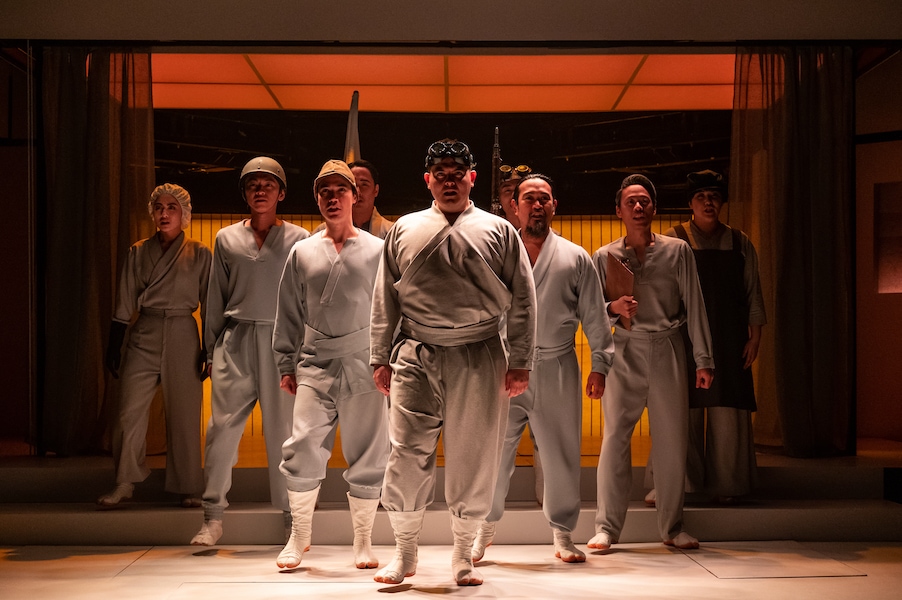
What do you think working with an all-Asian cast has taught you about yourself, personally or creatively?
I started work on the show with some trepidation about “Am I Asian enough? Is it okay to be half-Chinese and directing a show about Japan?” Asia’s not a monolith. In fact China, Japan, Korea, Vietnam, all these countries not only have very specific identities and cultures but there have been historical traumas between these countries.
I think what emerged for me was a loving community of artists who, with their own integrity, their own backgrounds and identities and experience, were coming together to tell this important story with as much respect and honor as they could. That was very moving, and it allowed me to trust myself more. The Asian artists around me who not only participated in the show but are coming to see it are feeding back to me a kind of appreciation for my leadership as an Asian American artist that is really empowering, and I’m very grateful for it. I haven’t always seen myself as an Asian American artist, but I’m excited to claim that more, and to be that leader more, if that makes sense.
Thinking about my time watching Pacific Overtures, I was really struck by how much laughter and humor was in the show. Take the song “Please Hello!,” which stages exaggerated caricatures of European countries establishing ports in Japan. You’ve staged it as a sensory feast that’s highly enjoyable, but as the number goes on, you’re realizing as an audience member how you’re sort of complicit in the colonial violence that’s going on. How did you negotiate that tonal balance? On the one hand, you want to give the audience an entertaining show. On the other hand, you want them to understand the realities of what is being staged.
I’m so glad you used that word complicit, and that you felt that. That definitely was the goal, by handing out flags, by seducing the audience into a fun time, a musical comedy number. But then hopefully also the audience experiences the mess of it, and the childlike competition of these foreigners who are loud, aggressive, and entitled, just taking over the space, and really littering on the space.
One of the things Chika Shimizu, the set designer, talked about from the beginning was wanting to create a pristine, calm, orderly Japanese aesthetic that really brought to life the feeling of a floating island, a floating kingdom, so that we really could read the transgression of the Americans and the other foreigners onto the island. I think when the show has been staged in a proscenium, it’s harder to sort of architecturally set up that transgression, but at Signature I thought we had this great opportunity to really use the turntables, and see the foreigners come from the corners of the room.
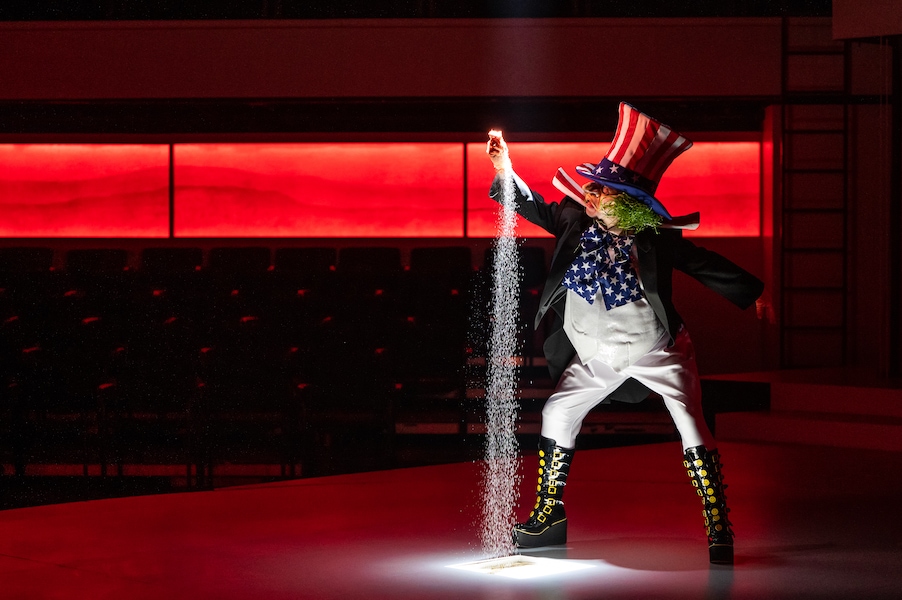
Tonally, it was definitely an experiment in rehearsals. Like, “What is the tone of this moment? How satirical is it? How frightening should it be? How funny should it be?” Commodore Perry in particular was this figure that we kept trying to fine-tune over the course of tech and previews, and he really changed. The final moments of Act I are definitely like a third or fourth draft version of that, and we learned so much from the costume when it came into the process, Our actor Nick [Nicholas Yenson] asked that we go back to the rehearsal studio with the full-length mirrors once he had the costume, because I think he needed to feel and see how the hat, and the mask, and the shoes, and the belly were all reading to us. We really had a robust discussion about the grotesqueness of Perry and the other foreigners. How monstrous are they? How alien? How human are they?
A similar tonal shift happens in the song “Pretty Lady,” which starts musically as a sweet-sounding song, but is in some ways masking the sexual violence between British soldiers and a young Japanese girl. I was very intrigued by the directorial choice for that Japanese girl to be portrayed by a puppet. In fact, throughout this production you represent Asian women in all sorts of different ways. In the song “Welcome to Kanagawa,” a madam is introducing her sex workers to British men, and many of the workers are played by performers in drag. Why was it important for you to stage women in the show this way, especially knowing the stereotypes and over-representation of Asian “geisha” figures in theater?
Helen Q. Huang is our wonderful costume designer and she really had that initial impulse to make the girl in “Pretty Lady” a puppet. Helen was very explicit about saying she didn’t want to see a female actor portray that role. She didn’t want to see that kind of sexual harassment and almost assault that happens with a human actor. I very much love this idea, and it kind of occurred to me, “Oh we could make all of the young people in the show, all the kids, puppets.” So I really appreciate Helen’s impulse and suggestion there.
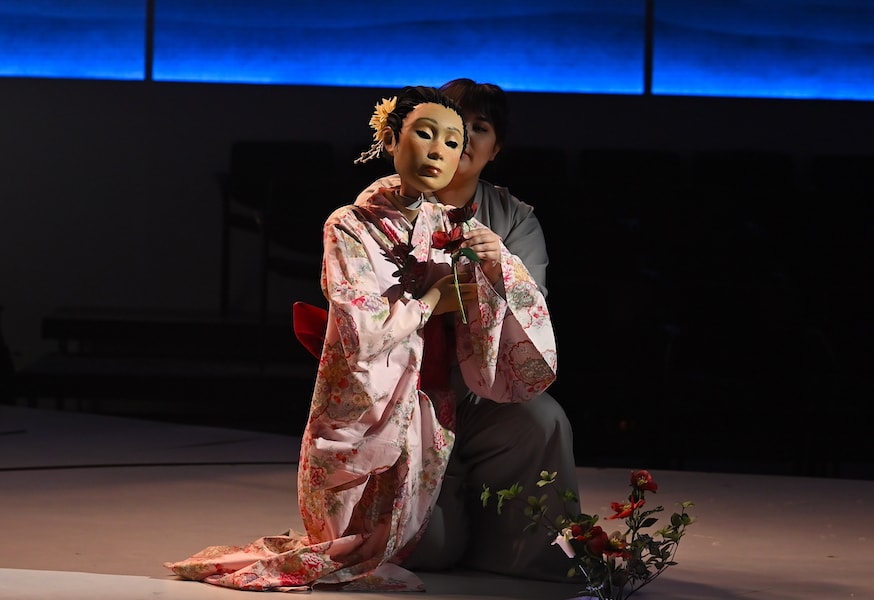
In terms of “Welcome to Kanagawa,” Sondheim has been open about saying he never thought that song quite worked, he was always fiddling with it, he kept rewriting the jokes, and it was sort of my nemesis, that song. I was very nervous working on it, because I didn’t want it to be cliché women. These are sex workers who are in the pleasure district, but we decided that they were not geisha. Geisha are a very particular high-art kind of entertainment and companionship, and this is not that.
In terms of gender, I was very open in the casting process to figuring out who these ten actors should be, in the ensemble, and I was considering women for the Reciter, I was wondering if a woman would play the mother of the Shogun, the Madam in “Welcome to Kanagawa.” Ultimately we ended up with eight male-presenting folks, two female-presenting folks. But people are playing all kinds of genders throughout the show, crossing back and forth. I love that in “Welcome to Kanagawa,” hopefully you see the beauty of these five people, and you see the comedy of this situation. But we didn’t want to make light of sex work or that transaction. I think what Weidman and Sondheim are doing really brilliantly is showing us these different transactions between Japan and the West. In a way, “Welcome to Kanagawa” is actually an empowering moment for those Japanese sex workers. They’re learning how to survive, how to make money, and build their business. I hope that it feels more complex than a typical cliché.
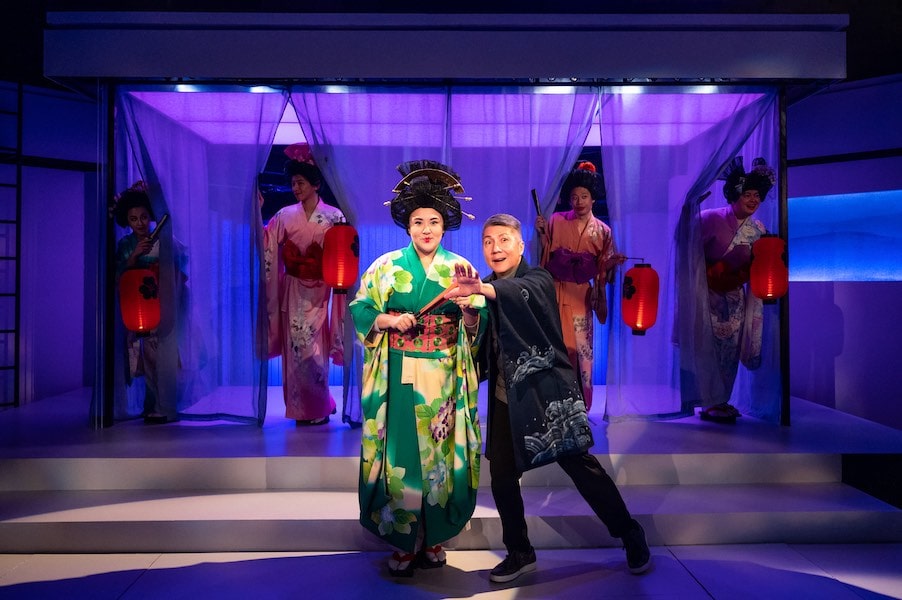
There’s a lot of discussion right now around musical revivals. When Steven Spielberg’s West Side Story film adaptation came out in 2021, many Puerto Rican writers such as Carina del Valle Schorske and Yarimar Bonilla were questioning why a 60-year-old musical written without consulting Puerto Ricans was still one of the most dominant narratives of Puerto Rican life. I think a similar sentiment could be applied to Pacific Overtures: this musical was originally made about Japanese people, not necessarily with Japanese people. At the same time, as an Asian American myself, I think it would be reductive to say that white playwrights or non-Asian playwrights can never write Asian characters. What conversations did you have with your team around these ideas? Did you feel empowered to help guide this story, even though you didn’t literally write it?
I’m very much with you and in tune with you about the sort of meta-questions. At a talkback with Signature, [John] Weidman said that three white upper-middle-class Jewish guys wrote Pacific Overtures in the 1970s. This is a different world now, we have a different understanding of identity politics, and what is appropriate and respectful. I very much believe in the beauty and truth of this show, and I think there are some problematic parts, but I don’t think that means we shouldn’t do it. I think it’s a noble, good effort to do the show and tell this story and shed light on its history and wrestle with the thorny aspects of its creation and authorship.
Weidman was very gracious speaking to us, saying that he views this production as a kind of beautiful completion of 47 years of work and history. Hal Prince, Stephen Sondheim, and John Weidman started work on [Pacific Overtures] in 1975/76, and Weidman was saying that this is us taking a kind of ownership of it, in a really powerful way, which I was just very touched and moved to hear.
Something that I felt like I could really bring to this show was incorporating Japanese expertise into the process and the production, not from me, but from colleagues that I invited in. And so I’m just really proud of the contributions, or grateful of the contributions, and proud of the team that included Kirk Kanesaka on kabuki, and Mark H. Rooney on taiko, and Yoshi Amao on the fights. I think their expertise, and their ethos, and sort of aura really permeates the production.
The list of contemporary Broadway musicals that focus on Asian American characters is quite short. Soft Power was a finalist for the Pulitzer Prize in 2020 but hasn’t been to Broadway yet. KPOP had a very short run on Broadway in 2022, playing only 17 official performances. Here Lies Love is coming to Broadway this year—but as a Filipino American whose family was impacted by the Marcos dictatorship, I have conflicting feelings about a show about that dictatorship. What kind of stories would you like to see for Asian American performers in musical theater in the future? I know that Jason Ma, the actor playing the Reciter in Pacific Overtures, is working on a new musical, Gold Mountain, about the Chinese men who built the transcontinental railroad. How does the theater industry support that work?
First of all, I want to see Asian actors play all kinds of roles. Watching this cast perform, and display all of their talents—several of these ensemble members are just transforming and transforming, just showing off all of their diverse talents. I really want to see them get to share those gifts and skills in all kinds of shows: classics, new work, shows that aren’t necessarily “Asian” shows but have wonderful Asian performers in them.
On the other hand, I do really think these affinity spaces, these shows with Asian themes that feature Asian performers primarily, are really important and powerful. I think they should be like Gold Mountain, a show about a historical moment, and/or they should be about the current moment, and about the future, too. Hopefully, all kinds of styles and genres. I just hope that Asian writers, non-Asian writers are including beautiful brilliant Asian and Asian American characters in their stories.
Is there anything you’d like people to know about Pacific Overtures?
I just celebrate these ten actors in particular who are on stage every night. I think some folks are taking for granted that you can do Pacific Overtures with ten people! To me, that is one of the virtuosic aspects of this production, that these ten actors are playing so many characters. That’s something I want to highlight and just celebrate, that what makes this production really fun is getting to see people transform.
Pacific Overtures played March 7 through April 9, 2023, in the MAX Theatre at Signature Theatre, 4200 Campbell Avenue, Arlington, VA.
The program for Pacific Overtures is online here.
SEE ALSO:
A gorgeously detailed ‘Pacific Overtures’ opens at Signature Theatre (review by Bob Ashby, March 16, 2023)




